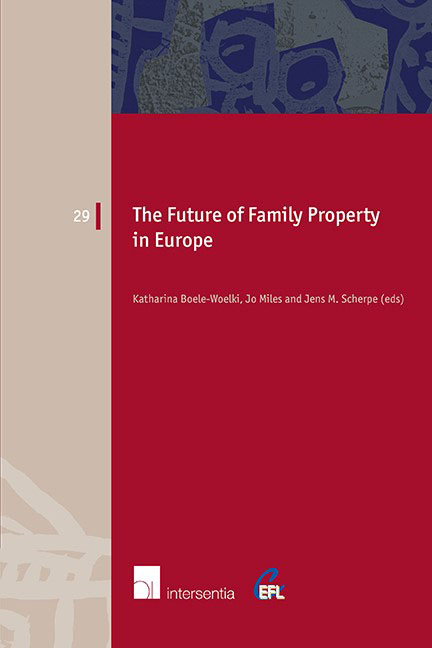Book contents
- Frontmatter
- Preface
- Contents
- List of authors
- PART ONE KEYNOTE LECTURE
- PART TWO MATRIMONIAL PROPERTY LAW IN EU ROPE
- PART THREE FAMILY CONTRACTS – ISSUES OF AUTONOMY
- PART FOUR PROTECTION OF OLDER PEOPLE IN LAW
- PART FIVE FREEDOM OF TESTATION AND PROTECTION OF FAMILY MEMBERS
- PART SIX CHILD MAINTENANCE
- PART SEVEN UNIFICATION OF PRIVATE INTERNATIONAL FAMILY LAW
- PART EIGHT CLOSING REMARKS
Contracting in Family Law: A European Perspective
Published online by Cambridge University Press: 08 May 2020
- Frontmatter
- Preface
- Contents
- List of authors
- PART ONE KEYNOTE LECTURE
- PART TWO MATRIMONIAL PROPERTY LAW IN EU ROPE
- PART THREE FAMILY CONTRACTS – ISSUES OF AUTONOMY
- PART FOUR PROTECTION OF OLDER PEOPLE IN LAW
- PART FIVE FREEDOM OF TESTATION AND PROTECTION OF FAMILY MEMBERS
- PART SIX CHILD MAINTENANCE
- PART SEVEN UNIFICATION OF PRIVATE INTERNATIONAL FAMILY LAW
- PART EIGHT CLOSING REMARKS
Summary
INTRODUCTION
Honore de Balzac proclaimed that to enter into a marriage contract was one of the holiest duties of a couple about to get married. In his novel Le contrat de mariage he describes the long and intricate negotiations that traditionally took place in France before marriage, not only in aristocratic but also in bourgeois families. Contracts with regard to matrimonial property are to date an integral part of most Continental European legal systems, as is the ensuing freedom of contract. In English common law, on the contrary, pre- or post-nuptial contracts were for a long time considered to violate public policy, and only recently have courts begun to accord them a role in the granting of financial relief upon divorce.
This controversy about party autonomy and its boundaries goes to the heart of marriage and family law: in family law, contracting can affect either the parentchild relationship, as do agreements on the exercise of parental responsibility, or affect affiliation or surrogacy agreements. Such contracts involve children as third parties, who are in particular need of the state's protection. Different questions generally arise when adults enter into agreements concerning their relationship: why and to what extent should they be free to determine the rights and obligations during the existence or upon the dissolution of their relationship? The degree to which couples may regulate their partnership by contract raises fundamental questions as to the role of marriage law in pluralistic societies. What is the state's role vis-a-vis increasingly diverse forms of partnerships and in view of a growing acceptance of different life styles and religious or ideological views? The answers to these questions vary: on the one hand, according to a postmodern view, we can dispense with marriage law completely and the regulation of intimate relationships should be left to private ordering. On the other hand, there is a marked tendency to create new types of partnerships in response to the increasing diversity of family life. In many Western countries, registered partnerships or civil unions provide new options for couples. In some parts of the US, state-sponsored alternative forms of marital agreement such as covenant marriages have been introduced. State regulation of de facto relationships or cohabitation has also increased, especially with regard to the provision of certain financial adjustments upon the dissolution of the partnership.
- Type
- Chapter
- Information
- The Future of Family Property in Europe , pp. 65 - 94Publisher: IntersentiaPrint publication year: 2011
- 1
- Cited by



